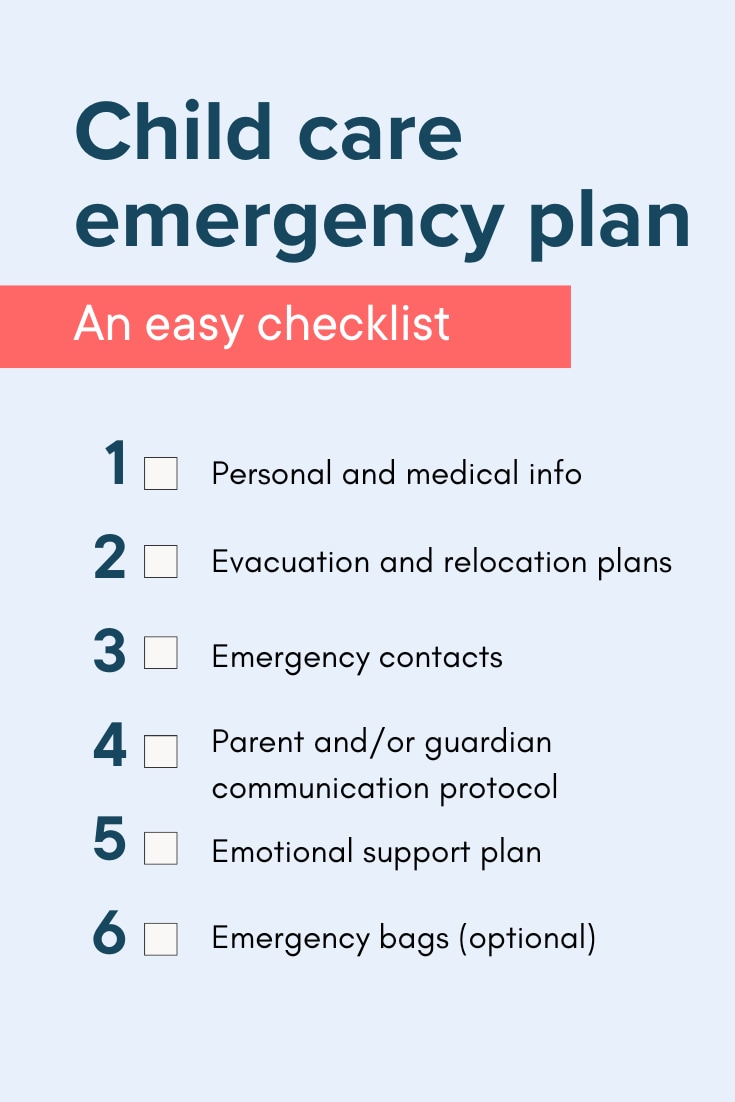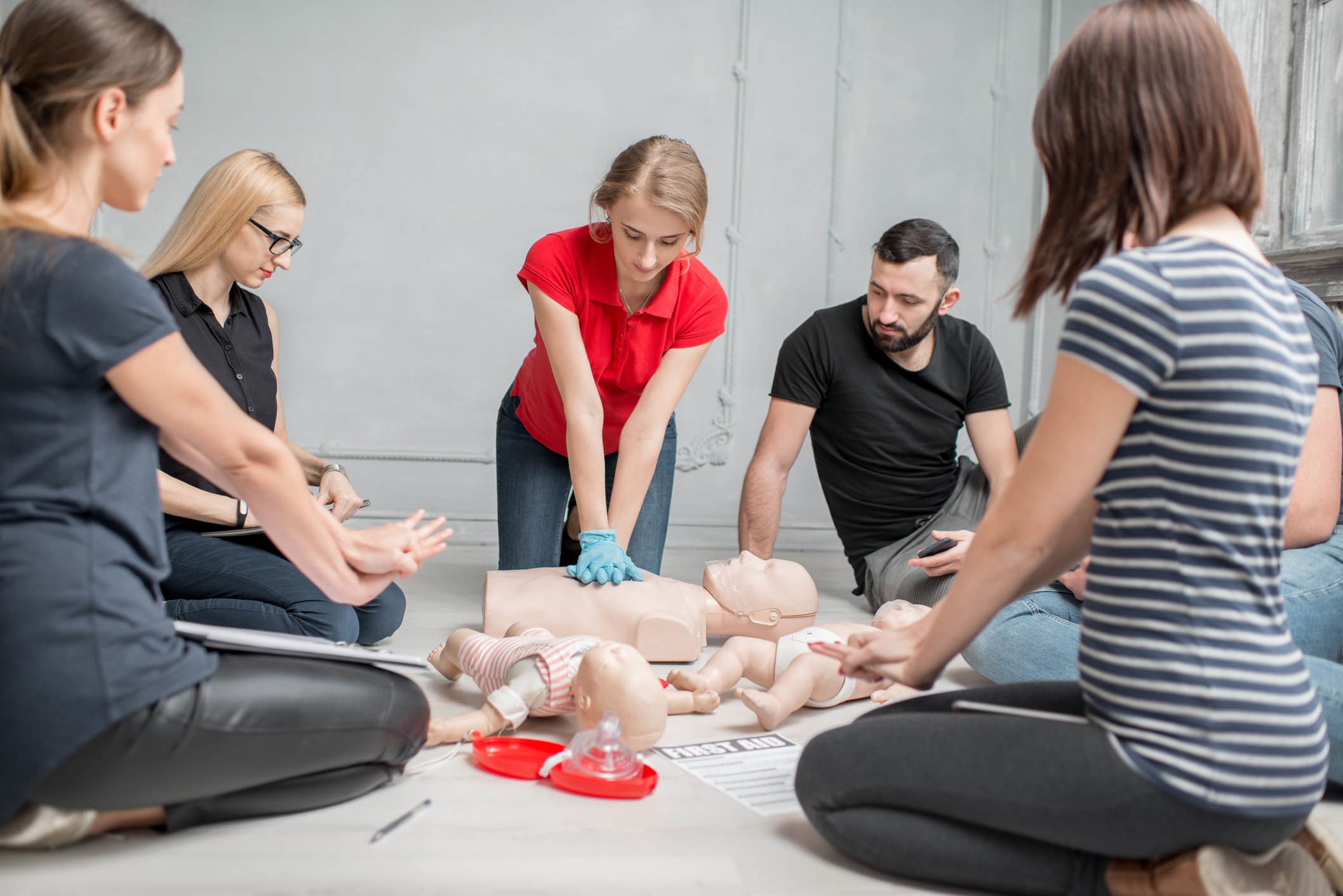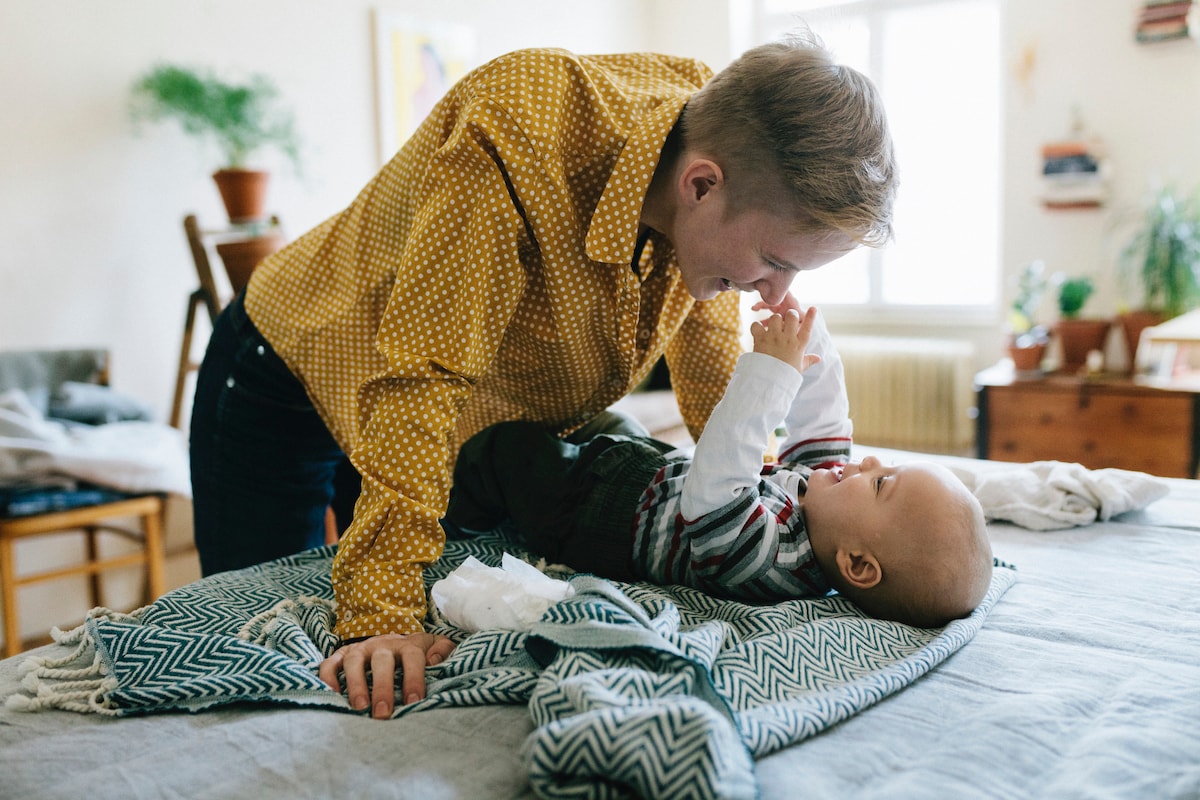In this article
Maintaining a level head as a child care provider is an important part of the job, but it’s even more important in a child care emergency. Whether a child in your care has a seizure or a natural disaster occurs, it’s imperative that you have an emergency preparedness plan in place to provide the best care possible.
“Emergencies often come without warning,” acknowledges Brandi Jordan, founder of The Cradle Company, a pregnancy and postpartum resource agency. But having an emergency preparedness plan can ensure you and your charges come out on the other side as smoothly as possible. “When you’ve taken the time to train, ask questions and stay informed, you’re not only protecting the children in your care — you’re building trust with the family,” adds Jordan.
But what is an emergency preparedness plan, and how do you create one? We asked pediatricians and child care experts to share the questions to ask parents, the training you’ll want to have and how to compile that information into the ultimate child care emergency preparedness plan.
Key takeaways
- Having a well-structured child care emergency preparedness plan helps caregivers respond effectively to various emergencies, ensuring the safety and well-being of children.
- Ensuring you’re keeping lines of communication open with parents regarding emergency procedures and offering real-time updates during crises fosters trust and reassurance.
- Regular CPR, first aid and emergency response training, along with periodic plan reviews, ensure caregivers remain prepared and adaptable as children’s needs and potential risks evolve.
What is a child care emergency preparedness plan?
Your child care emergency preparedness plan will vary based on the role you hold, where you live and more. Some states may even require you to follow a specific format or form, depending on what kind of child care provider you are. For example, here is a a Minnesota state-required child care emergency plan, as well as the Federal Emergency Management Agency’s (FEMA) Sample Childcare Emergency Action Plan.
In general, a child care emergency preparedness plan will contain:
- Basic information about the children under your care (name, date of birth, allergies, guardian contact information).
- Potential emergency situations you could encounter (e.g. severe weather or a medical emergency).
- Policies for parent notification.
- Instructions for evacuation or relocation.
- Emergency contact information (pediatrician, police, local hospital).
“Emergencies often come without warning. When you’ve taken the time to train, ask questions and stay informed, you’re not only protecting the children in your care — you’re building trust with the family.”
— Brandi Jordan, pregnancy and postpartum educator
Why do I need a child care emergency preparedness plan?
Why is it so important to have an emergency plan in place? While having appropriate child care training, education and experience under your belt is important, you also need to have a game plan should an emergency happen. Knowing how you’ll handle an environmental, health or household incident will help keep both you and the child or children you’re caring for as safe as possible, provide a sense of calm and allow everyone to get back to normal faster. The experts explain more below.
It creates a safer environment
“We’ve all seen how quickly kids can get into ‘mischief,’” says Dr. Liz Placzek, a pediatrician at Children’s Minnesota in West St. Paul, Minnesota. And while that is typically limited to minor bumps and bruises, having a child care emergency preparedness plan helps guarantee that you are ready for more serious situations and that the child or children in your care get the right attention quickly, adds Placzek.
For your child care position, this might mean taking refresher courses on cardiopulmonary resuscitation (CPR) and first aid on a regular basis, mapping out the quickest route to your closest pediatric emergency room and/or having a designated meeting place in the event of an emergency that requires you to relocate (an earthquake, for example).
Everyone feels more comfortable
No one wants to think about bad things happening to their children or around them, but ignoring those possibilities will not make them go away. Instead, citing the uptick in once-in-a-lifetime natural disasters, it’s more important than ever that child care providers be prepared to handle whatever comes their way, says Katie Provinziano, chief executive officer and founder of Westside Nannies, based in Beverly Hills, California.
Having the pertinent tools, information and training under your belt helps you “feel empowered to make decisions should a problem arise,” says Jordan who adds that this gives parents peace of mind, knowing their children are in the hands of competent caregivers.
Improves recovery time
Experiencing an emergency situation can be distressing for children, parents and caregivers alike. An emergency can mean parents and caregivers miss work, and children’s routines are upset. But having a plan in place can allow everyone to return to normal as quickly as possible.
How can I create a child care emergency preparedness plan?
In some situations, you might have an emergency plan template already created for you, either by your employer or through government regulations. If you don’t, or you want to make sure yours is comprehensive, the experts we spoke to shared guidance on how you can create your own.
Get the training you need
It might feel obvious, but it warrants saying that appropriate training can help you feel more prepared to handle an emergency. In addition to becoming CPR certified and taking first aid training, it can also be valuable to educate yourself on the following:
- Choking safety.
- Water safety is a skill Provinziano says families often request, particularly families with pools or who live near bodies of water.
- Basic household safety, such as how to shut off gas and water lines and how to use a fire extinguisher, says Jordan.
- Child-specific medical training, such as administering an EpiPen or managing diabetes.
Talk to the parents
If you’re in a position where an emergency plan hasn’t been discussed or provided to you, Provinziano recommends making time to talk to the parents. If you’re unsure of what to say, she suggests trying something like “I’d love to make sure I’m prepared to support your family in case of an emergency. Does your family have a plan in place should the need arise? If not, I’d love to help create one.”
Consider what kinds of emergencies you could encounter
Depending on your position, the child you’re caring for, where you’re located and other factors, your emergencies may look different than someone else’s. If the child you care for has a seizure disorder, you will have different protocol to follow than someone who cares for a child who does not. With that in mind, here is a list of potential emergency situations you might run into as a child care provider:
- Severe weather, such as tornadoes, wildfires and flooding.
- A health event. According to Dr. Ashanti Woods, a pediatrician at Mercy Family Care Physicians in Baltimore and Placzek, the most common health-related emergency events are an asthma attack, seizures, choking, ingestion of adult medication, foreign body in the nose or ear, allergic reaction, head injury and dental trauma.
- A household incident like a fire starting in the home.
“Emergency situations can be stressful for adults, let alone children. They may be frightened or anxious during emergencies, and calming techniques can be crucial in these situations.”
— Gigi Schweikert, parenting and education expert
What should my child care emergency plan include?
In addition to the experts walking you through what to include in your child care emergency plan, certain agencies may have their own plans you can draw inspiration from. For example, Westside Nannies has a four-step emergency preparedness plan for nannies and families. Once you’ve created your plan, don’t forget to keep a copy somewhere safe and easily retrievable (such as with your first aid kit or a go bag), in the case of an emergency situation.

1. Personal and medical information
In any emergency situation, medical providers will need basic information about the child in your care. Here’s what your list should include:
- The child’s name.
- Their date of birth.
- Their most recent weight.
- Any allergies they have, including any to food, medications and environment.
- Any medications they are taking.
- The name of their doctor and the clinic phone number.
- An emergency contact.
- Any medical history information, including things like a speech or developmental delay, asthma, seizures, etc.
2. Evacuation and relocation plans
If you have infants (or children with limited mobility) under your care, how you will safely evacuate them needs to be included in your plan. Gigi Schweikert, parenting and education expert and chief executive officer of Lightbridge Academy says each location utilizes evacuation cribs for infants, and designated caregivers are responsible for their safe evacuation.
Your evacuation and relocation plans should also “cover clear evacuation routes and designated safe spots,” says Schweikert. And if there is a potential for extended relocation (say, there is flooding in the area), that location should be included in the plan.
This section of your child care emergency plan would also be a good place to note if the child requires any necessary or life-saving medication to be retrieved before evacuating.
3. Emergency contacts
In addition to phone numbers for the parents and/or guardian, here are some ideas of what other contact information your plan should include:
- Emergency contacts, in case the parents aren’t reachable.
- The nearest emergency room or urgent care.
- The child’s pediatrician.
- Poison control.
- Your local police station.
4. Parent and/or guardian communication protocol
During an emergency, Woods acknowledges that everyone involved is likely to be a little rattled. The parent in question is likely already on edge from receiving a call that something has happened involving their child. Woods advises starting the conversation with if the child is OK or not.
“Parents want to know if their child is breathing and awake first,” he says. Start with their condition, he says — for example, “Billy’s OK, but he swallowed a quarter, and we’re headed to urgent care. Can you meet us there?” or “Vanessa is having a seizure. I called 911, and they are on the way. We gave her seizure rescue nasal spray, and we’re waiting for it to kick in. I will stay on the phone with you until they get here and tell you what ER they are taking us to.”
In the midst of an emergency, you may not always be able to notify parents (or designate someone else to do so), but your plan should include policies for how communication will be handled with parents during or after an emergency. Schweikert says her “team provides continuous updates throughout the situation and follow-up afterward with detailed information on actions taken and safety measures.”
5. Emotional support plan
While your focus will be (and should be!) on the immediate physical safety of the child or children in your care, it’s also important to have a plan in place to support the children emotionally, says Schweikert. “Emergency situations can be stressful for adults, let alone children,” she points out. “They may be frightened or anxious during emergencies, and calming techniques can be crucial in these situations.”
What these techniques look like will vary by age; for example, singing and rocking may be helpful for younger children, while older kids may respond well to breathing exercises.
For a handy on-the-go resource, the Pediatric Emotional Distress Reference System (PEDRS) app from the Colorado Department of Public Health and Environment provides both calming and distraction techniques that are sorted by age.
6. Optional: Emergency bags
While it’s not a requirement, creating to-go emergency bags is easy and can provide respite for both you and the child or children you’re caring for during an emergency. You can include whatever you choose, but Schweikert says the bags in Lightbridge Academy classrooms are fully stocked and have quiet activities and comfort items for the children. This could include loveys, blankets, crayons and paper or other portable activities for kids. You might also add things like a first aid kit, some snacks and a copy of your child care emergency preparedness plan.
What else can I do to prepare for an emergency as a child care provider?
A child care emergency preparedness plan is only as good as the information included in it. And if that information is outdated, it’s useless. So make a plan to keep your child care emergency plan updated.
“As kids grow up and schedules and needs change, it’s great to revisit the plan to ensure it still works for everyone,” says Provinziano. You can be systematic and update it on a regular basis (think every six months or once a year) or as needed. And if you need a script, Provinziano recommends saying something like, “It’s been a while since we’ve chatted through our emergency plan. Could we find a time this week to walk through the steps together?”
Ultimately, as Schweikert concludes, keeping an updated and clear “emergency plan ensures quick, effective responses that prioritize child safety and provide parents with timely communication and reassurance.”





